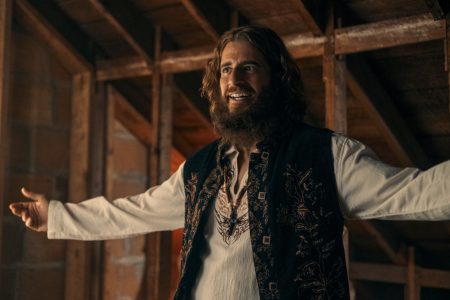'Jesus Revolution' review: Emotionally powerful film highlights how God uses broken people to bring revival

The Jesus Movement was one of the most pivotal events of the 20th century, leaving an undeniable imprint on culture, music and most notably, the Church and evangelism. But it hasn’t been at the forefront of film and movies — until now.
“Jesus Revolution,” hitting theaters on Feb. 24, tells the true story of the revival that began in hippie communities on the West Coast in the late 1960s, eventually spreading across the country and bringing millions of souls to Christ.
Starring Kelsey Grammer (“Frasier”), Jonathan Roumie (“The Chosen”) and Joel Courtney (“The Kissing Booth”) and directed by Jon Erwin (“I Can Only Imagine”) and Brent McCorkle (“Unconditional”), “Jesus Revolution” isn’t preachy or political; it doesn’t rely on genre tropes to carry the story. Rather, it’s a tender, heartfelt and sometimes humorous look at the complicated figures behind the Jesus Movement and how a revival was sparked among the most unlikely of people groups, paving the way for many churches and Christian music today.
“Jesus Revolution” is set against the backdrop of the late 1960s and early 1970s, a period when young people were searching for meaning and belonging. It opens on Pirates Cove Beach in California, where a Time magazine reporter is on the scene of a revival; a long-haired figure is baptizing people in the ocean while hundreds, including Pastor Chuck Smith and a young Greg Laurie, look on. He’s both intrigued and confused.
“What you’re seeing is a symbol of new life,” Smith tells the reporter. “Every regret, every doubt, all washed away, forever.”
The film flashes back to a year earlier when Laurie is living in a small trailer with his alcoholic mother (Kimberly Williams-Paisley). He’s attending a military academy, and he’s restless and lost — until he meets a beautiful young woman, Cathe, who invites him to join her crew to travel to Southern California. Though raised in a religious home, Cathe is eager to break free from all rules and restrictions and turns to drugs in a bid to do so.
Meanwhile, Smith is watching a news report about the hippies — and he’s disgusted. They’re lost, aimless anti-war fanatics and frankly, they need a bath. They are, he tells his congregation, a “generation without restraints.”
And then his daughter Jeanette picks up a hitchhiking hippie who introduces himself as Lonnie Frisbee. He looks oddly similar to Jesus, and he’s passionate about bringing souls to Christ — and Jeanette is eager to introduce him to her dad. Though initially resistant, Smith is moved by Frisbee’s testimony and opens the doors of both his home and his church to the street preacher’s crew of hippies.
After facing opposition from church leadership over the inclusion of hippies in services, Smith publicly announces his church welcomes all people, hippies and all, and it’s not long before a movement begins.
“You’re going to need a bigger church,” Frisbee tells him — and from there, the Calvary Chapel Movement is born.
Laurie’s life is about to be upended too. After Cathe’s sister nearly overdoses, Cathe becomes disillusioned with the lifestyle that promised her freedom. And when his friends nearly crash their van while high on drugs, a frantic Laurie meets Frisbee who introduces him to Jesus and the promise of eternal life. It’s not long before the two are baptized into Smith and Frisbee’s church.
As the revivals grow bigger, Frisbee begins performing acts of healing, and thousands are saved. A budding pastor himself, Laurie becomes an eager participant in Frisbee's evangelistic efforts. But soon, friction erupts between Smith and Frisbee as the latter becomes distracted by his ego.
“There would be no movement without me!” he declares before announcing his exit from Smith's church, much to Laurie’s dismay. But before Frisbee leaves, he shares a vision God gave him: He saw Laurie speaking before thousands, sharing the Gospel.
However, Laurie is still struggling with trauma from his childhood, as well as personal troubles: He's facing resistance from Cathe’s parents when he asks for permission to marry her, and frankly, he’s not sure he should be entering the ministry. But God has other ideas, and in one pivotal scene in the movie, Smith looks on smiling as Laurie baptizes people in Pirate’s Cove.
Today, thanks to the mentorship of Smith, the credits say, Laurie began leading his own church, Harvest Christian Fellowship, which is now one of the biggest churches in the U.S. — and he and Cathe have been married for almost 50 years. The influence of the hippies behind the Jesus Movement, known as “Jesus freaks,” had on Christian culture is still seen today, particularly in Christian rock and gospel music.
“Jesus Revolution” is a visually stunning film, with sweeping shots of California beaches and colorful costumes. Fast-paced and entertaining, it’s at times humorous and often touching, with the love story between Greg and Cathe serving as the emotionally powerful backbone of the film.
Rated PG-13, it does touch on difficult subjects like drug abuse, alcoholism and infidelity. Filmmakers also make a point to highlight the humanity of the characters; Frisbee and Smith are portrayed as complicated men who God used for His purposes despite their flaws and missteps. It drives home the biblical truth that no one, not even hippies or pharisaical religious people, is beyond God’s saving grace. It’s a story of real faith lived out in all its beauty and messiness.
Ultimately, “Jesus Revolution” is a movie about Jesus; about how even in the darkest of times, He’s moving; working within hearts and minds to provide hope and true freedom. At a time of societal unrest and confusion that mirrors the '60s and '70s, “Jesus Revolution” provides a much-needed jolt of hope.
Leah M. Klett is a reporter for The Christian Post. She can be reached at: [email protected]






















